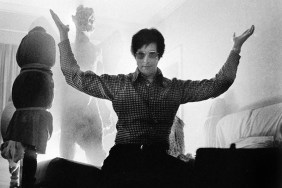Now available on DVD

Cast:
Andrew Howard as Nick West
Pollyanna Rose as Sammy
David Gant as Dr. Willard
Elize du Toit as Rachel Fowles
Matt Berry as Brett Wilson
Directed by Adam Mason
Review:
Every year, scores of low-budget horror movies vie for the right to be called the next Evil Dead or the next Hellraiser – the next indie standard-bearer for ultra-violent shock. Whether these films make good on their ambitions or not (usually not), some credit must be given to those that go for the gutso as readily as 2006’s The Devil’s Chair (just now making its way to DVD) does. Directed by Adam Mason (Broken) and written by Simon Boyes, the UK-lensed The Devil’s Chair offers us the tale of troubled, hard-bitten anti-hero Nick West (Andrew Howard), who narrates the film in the first person. Nick has had some rough times in his life, beginning with the day he took his girlfriend Sammy (Pollyanna Rose) to an abandoned mental institution, dropped acid with her, had sex on a mysterious, bone-adorned chair which then proceeded to clamp her down, drill holes in her, and haul her off to some unknown dimension. Because there’s no sign of the girlfriend, and no way to prove the veracity of Nick’s story, he is promptly incarcerated in a mental institution for the next four years.
It’s then that Dr. Willard, the eccentric older psychiatrist (David Gant) in charge of Nick’s treatment, has a plan to cure Nick â to take him back to the scene of his girlfriend’s disappearance and trigger his memories of that day. It’s the kind of unconventional cure for mental illness that one only finds in horror movies â take a potential killer back to the scene of the crime with only a group of academics to chaperone him! On this risky venture, Dr. Willard, (who Nick disparagingly refers to in his voiceover narration as ‘Gandolf’) brings along a handful of his best students: drop-dead gorgeous Melissa (Louise Griffiths); Brett, the snarky schlub (Matt Berry, who looks a bit like like Oliver Platt); and Rachel (Elize du Toit), the obligatory good girl.
When this well-meaning crew tries their luck in bringing Nick on a murderous mystery tour, things go south (of heaven) very fast. These educated types prove just as apt as any I.Q.-challenged teen from a slasher movie to do exactly the one thing they shouldn’t do – sit their asses in the chair. And as they do, one by one they end up in some parallel dimension finding themselves pursued by a demon.
Portrayed by an uncredited Graham Riddell, the demon itself is a pretty nifty sight. The costume is obviously a low-tech creation but it’s shot to great effect and its mass of waving tentacles gives it a hint of Lovecraft. The entire production makes the most out of its low budget, in fact, getting plenty of mileage out of locations like the abandoned mental asylum. And the cast is capable, especially Howard as Nick. His narration holds the film together and while it may remind one too much of A Clockwork Orange, Howard’s delivery is appropriately charismatic.
The ultimate problem with The Devil’s Chair is that its overload of violence becomes monotonous well before the film’s end. Some jaded splatterhounds believe that when it comes to hardcore horror, a movie can’t be too bloody but I think that even violence can be tedious in the wrong hands. And as The Devil’s Chair wore on, I became inured to not just the constant bloodshed but all the screaming and cursing as well. There’s a skill to making an exciting ultra-violent movie and Mason doesn’t have that knack yet. There’s a lot to recommend to The Devil’s Chair on a technical level but what’s meant to be intense often comes across as laborious.
There’s a lot of ambition on tap here, though, and this is overall a much better bet than most DTV fare. For some, the sheer amount of blood that’s spilled in The Devil’s Chair will be a recommending factor. But for me it was a case of a film trying too hard to convince viewers of its badass pedigree. Violence has become a bit like wallpaper these days so making viewers notice it is more work than it used to be. Just being more brutal than the next film it isn’t always enough. I’m also not that keen on films where the narrator is unreliable â where the reality of the film’s POV may be suspect. When they work they can be brilliant (as with American Psycho, for example) but that’s a tough act to pull off and, again, The Devil’s Chair isn’t altogether successful on that count.
Watching The Devil’s Chair, I got the feeling that Mason and co. were sincerely trying to make the kind of horror movie they thought fans wanted to see, with attitude and blood to spare. But as they say, the road to hell is paved with good intentions.










